The World Bank has approved a $194 million aid package aimed at improving education and water infrastructure across Pakistan, signaling a major boost to national development efforts. The funds will be channeled into school rehabilitation projects, classroom expansions, access upgrades for girls, and the construction and enhancement of water supply and sanitation facilities in rural districts .
Education officials say the initiative will improve learning conditions for thousands of students—especially girls—in underprivileged regions. Investments include refurbishing existing schools, building modern classrooms, and providing essential furniture and learning resources. With education at its core, the project also places emphasis on gender equality by focusing on female student enrollment and retention in districts where girls have traditionally lagged behind .
In tandem with the school upgrades, a substantial portion of the funding will be directed to new water pumping stations, clean water treatment facilities, and sanitation systems designed to benefit rural communities. Public health experts point out that access to safe water and hygiene is crucial for keeping children in school—reducing absenteeism caused by waterborne illnesses and helping improve overall student performance.
This dual-focus programme echoes previous World Bank efforts, such as the $150 million GRADES project in Punjab, which was targeted at reducing dropout rates and enhancing primary school outcomes. Unlike single-sector efforts, the current combined approach recognizes the direct link between improved water and better education—using one developmentively to reinforce the other.
Local communities are expected to play a key role in keeping these systems up and running. The project includes training for school management committees and village councils, aiming to build long-term stewardship for both school facilities and water infrastructure. This community-centric model aligns with Pakistan’s growing need for sustainable development solutions .
While the $194 million package reflects a major investment, challenges remain. Pakistan continues to grapple with limited fiscal resources, bureaucratic hurdles, and logistical issues in remote areas. Plus, success hinges on effective coordination between federal, provincial, and local authorities—something that has historically been a weak spot. Still, with strong implementation, this investment could break cycles of poverty by providing education and health benefits that ripple across generations.
In a climate where both human capital and public health are under threat, the World Bank’s dual-sector strategy could mark a turning point. Better schools and cleaner water—not in isolation, but together—offer a blueprint for sustainable development across Pakistan.




This initiative by the World Bank is a significant step towards addressing critical issues in Pakistan’s education and water sectors. By focusing on both school improvements and water infrastructure, the project aims to create a sustainable impact on communities. The emphasis on gender equality and female education is particularly commendable, as it addresses long-standing disparities. The involvement of local communities in maintaining these systems ensures long-term success. How will the government ensure the effective implementation and monitoring of these projects to maximize their impact? German news in Russian (новости Германии)— quirky, bold, and hypnotically captivating. Like a telegram from a parallel Europe. Care to take a peek?